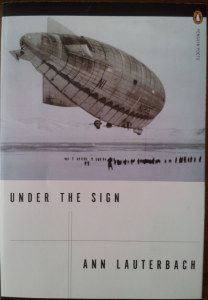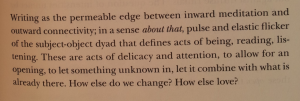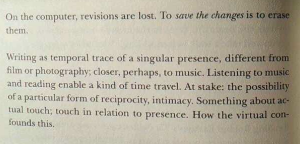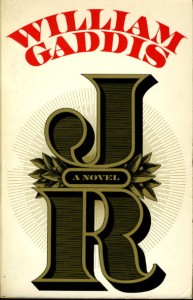Creative Writing 101: All’s Well That Ends Well
 I am writing this late on Thursday night, having just gotten back from my ~2 hour commute from Rutgers. I’ve got my shoes off and have poured myself a big fat Jim & Ginger, a solitary if not precisely lonely celebration of the end of my teaching semester, my first one as an instructor of college-level creative writing. If this were an MFA program, I probably would have insisted we adjourn our session to a bar, but since about 3/4 of the students can’t (or can’t legally) drink in a bar, I brought a box of Oreos to class.
I am writing this late on Thursday night, having just gotten back from my ~2 hour commute from Rutgers. I’ve got my shoes off and have poured myself a big fat Jim & Ginger, a solitary if not precisely lonely celebration of the end of my teaching semester, my first one as an instructor of college-level creative writing. If this were an MFA program, I probably would have insisted we adjourn our session to a bar, but since about 3/4 of the students can’t (or can’t legally) drink in a bar, I brought a box of Oreos to class.
Some of those who had been following the CRW101 threads expressed disappointment when they stopped appearing, about a month ago. As I think I explained at the time, that was because we switched from close-reading literature-discussion mode into workshopping-student-work mode, and since I made a commitment at the outset of this series not to identify individual students or subject them to public scrutiny, that didn’t leave me with a whole lot to talk about.
Creative Writing 101
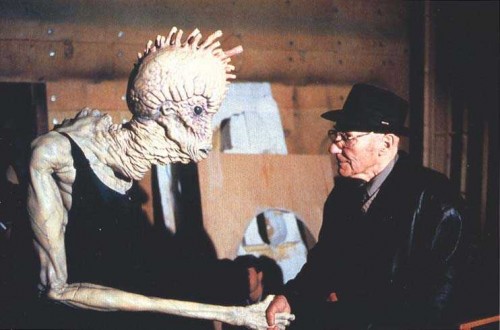
Tuesday, 10/13. Shredded Text Day.
For Tuesday we read a few brief excerpts from Naked Lunch (Dr. Benway’s “aesthetic surgery,” and “have you seen Pantopon rose”) plus four selections from Gentle Reader! a collaborative book of poetry written by Joshua Beckman, Anthony McCann and Matthew Rohrer. If you’ve never heard of this book, it’s because it was privately (or, if you want to be a dick about it, self-) published by the three poets, and hence is not generally available. (I cadged a copy from Rohrer.) The poems are not written collaboratively–I don’t think–but they’re all unsigned, so you have to guess who wrote what. Also, each poem is an erasure of a Romantic-era text. There’s a key at the back. Since I don’t have the materials ready-to-hand (I’m posting this from a writers’ retreat in Breckenridge, CO, where I’m serving as writer-in-residence for the weekend) I can’t tell you much about the poems, other than that the one called “I Was Alive” is an erasure of Frankenstein, and that it was written by Anthony McCann–both of which things I know because McCann first published the poem non-anonymously in the Agriculture Reader.
Anyway, we didn’t do a lot of textual analysis, and so you won’t be getting the usual slate of close readings. I was more interested in presenting a variety of non-narrative forms, and in talking about the technical aspects of the processes used to create the works. Then we busted out the scissors, Sharpies, and photocopies, and got down to the good work of fucking shit up.
Creative Writing 101

(for previous installments in this series, click here)
WORK DISCUSSED THIS WEEK: “Ancestral Legacies,” “On the Subject of Fiction Based on Non-Ficton,” and “The Gun Lobby” – all by Jim Shepard.
My goal for this week was to give the class another sense of the scope of writerly possibility. This time, instead of pairing different mediums of writing or organizing some little squad of unrelated writers together around a common theme, I chose to showcase two very different works of fiction by the same writer. “Ancestral Legacies” is historical fiction, and follows two Nazis on a pseudo-scientific mission to Tibet. (Himmler has ordered them to trace the path of a legendary Aryan ur-language; believing Himmler’s claims to be nonsensical, but their own to be legitimate, they’ve taken his funding and are using it to conduct their own research into the existence of the yeti.) “The Gun Lobby” is about a suburban marriage falling apart–the wife has taken the husband hostage in their home.
The biggest surprise came first– large factions of the class didn’t like “Ancestral Legacies.” They thought it moved too slowly, and was “boring.” I couldn’t believe this. Nazis! Tibet! Yeti! And they were “bored…”
Creative Writing 101


[ WORK DISCUSSED: Tuesday (9/22) – Adrienne Rich, five poems and an essay. Thursday (9/24) – “New York” by Tony Towle; “Texas” by Padgett Powell; “Babalu-Aye” by Eva Talmadge;” writing exercise.]
I never know how to start the class off. Or anyway that’s how it feels. I usually arrive in the room a few minutes early, and start chatting with whoever else is already there. If there’s a conversation already in progress I’ll try to join it, and if they’re all just sitting around quietly I’ll pick someone and ask how his or her day is going, or how the weekend was. If they throw the question back at me (“and how about you?”) I’ll tell them. I try to take attendance right at the official start time, not so much to punish the stragglers as to reward those who got there early. I want them to see me seeing the effort they’ve made. So we do that, and it’s like–now what? “Okay,” I often find myself saying, “what did we read for today?” It’s not that I can’t remember what we read. It’s just that I think there’s something useful about saying it out loud. I asked the class if they preferred to talk about the poems or the essay first. A few people kind of said “poems,” so I said okay, but then there was another choice to be made–which poem? One of the pitfalls of my teaching style (which strives to be dynamic, responsive, and rigorously un-structured) is that it’s hard to get off the ground. It’s like an old prop plane, where you need to start the propellers spinning by hand and then sort of guide it down the runway and hope everything is timed just right and take-off actually happens. Sometimes this takes a few tries. Nobody seemed to care where we started, and consequently we weren’t starting at all.
Creative Writing 101



For Thursday (9/10) we read “My Dog is a Little Obese” by Ellen Kennedy, “How to Date a Browngirl, Blackgirl, Whitegirl or Halfie” by Junot Diaz, and “To His Coy Mistress” by Andrew Marvell. The theme was DIRECT ADDRESS and INSTRUCTION. As on Tuesday, we spent most of the time on the fiction piece. I think this is because fiction feels “easier” to talk about than poetry, like you’re not going to screw up the technical terms or something. And I think that having a teacher who is primarily a fiction writer contributes to this atmosphere, so I’m going to work harder in the future to check myself. But I think there’s a second reason as well, which is that a relatively straight prose narrative like the Diaz story (or Hemingway last week) yields itself to a kind of knee-jerk cultural studies reading, where the text is really just a pre-text for the themes and politics it evinces or brings to light. Especially with a piece like this one by Diaz, where the narrator is giving “you” instructions on how to re-arrange your apartment so you don’t look as poor as you are, and then impress the various girls you might have invited over, with particular race-based instructions for each one. I hate this way of reading.
FUCK YER BRAND, IMMA DO ME (/help me figure out my brand?)
[u shd probably read the NOTE(S) as they come up for cohesion, but do as u wish, obvi]
so there s a lot of things that have been going on here, on our dearly beloved htmlg. there seems to be an even bigger emphasis than ever before on attn. and i won t lie, it is nice to feel that w/e it is i might have written here might have been read or provoked a thought to someone—ANYONE—outside of me. but the reason i am writing this, right now is to set up a personal statement of sorts for how i want to use this site, as someone who regularly (?) tries to put stuff up…
MISSION STATEMENT(S)
I will refuse to care about being “cool.” I reject the notion of a grotesquely narcissistic coolness in an alt lit universe, where we are all nerds, when viewed through the larger lens of people who are not only unaware of this lit stuff, but also actively ignore its existence.
Perhaps I am just the biggest loser in the universe, but I like to care. If I did not, maybe I would not want to write. The reason I started writing was to figure out things I was genuinely curious about, not always in a healthy fashion. It was not to one-up anyone, not to be smarter in a gimmicky sort of way that will fade and might feel cheap in a couple of years.
HTMLG was one of the places online I constantly returned to when I was in a cubicle day after day doing shit I hated, trying to find a way out. To me, it used to be a liberating space, a meaningful forum that introduced me to writing I care for, and still value. Now, it is confusing. I have the hardest time figuring out the intentions behind what is being written. Sometimes I wonder if pressing “publish” was the entire goal of some contributor; I do not think it should be. [1]
An amazing book of poetry was loaned to me, to remind me of my incentives and goals. Ann Lauterbach is brilliant, even though she cares. Or maybe because of it. I do not write poems, but her intentions—as presented in the middle section of “Under The Sign” are ones I would like to have as ideals.
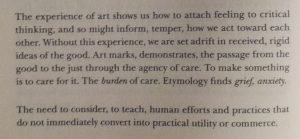
So perhaps caring is not so bad. I will not actively try to not care about writing; writing by those who don’t care does not interest me.
But to care, one needs to put something at risk. One must “open,” perhaps even lose a part of their “security”—usually stemming from exercising a controlled performance of confidence—by showing insecurity. Being clevererererer just shouldn’t cut it if one wants to be true to oneself. [2]
I like the way Lauterbach understands writing. I wish we all agreed on that a little more, but I won’t force it upon you, because that would go against my principles.
NOTE(S)
[1] It is entirely possible that the reason I feel this way about putting words together in a creative way is because I did not study it. Maybe the excessive studying of something leads some of my fellow HTMLG contributors to an insipid cynicism that is often reduced to “being smarter.” Maybe it has to do with the frustrations of a young writer—or new, actually— as an immaterial existence in a material universe: the rewards of writing are rarely fiscal.
The fixation on rapid success that is intrinsic in late-capitalism has infected our immaterial universe, stigmatizing creative intentions. And I am aware money is—and probably will be—an issue for a lot of us/ you/ whatever you want me to say. But to let it dictate creative intentions would be embracing defeat.
Interview with Christine Lee Zilka and Jennifer Derilo of the Kartika Review
I’ve always been curious about the darkroom where literary magazines come together. This is a series of interviews engaging, talking, and sometimes annoying editors about their magazines. How did they come about, what do they hate about editing, and what do they love most about it?
This is the third in the series and I talked with Fiction Editor, Christine Lee Zilka, and Creative Nonfiction editor, Jennifer Derilo. Their about page has the following description: “Kartika Review is a national literary arts magazine that publishes Asian Pacific Islander American fiction, poetry, creative non-fiction, and art. Kartika Review serves the Asian Pacific Islander American (APIA) community and those involved with Diasporic Asian and Pacific Islander-inspired literature. We scout for compelling APIA creative writing and artwork to present to the public at large. Our editors actively solicit contributions from established virtuosos in our community in hopes their works here will inspire the next generation of virtuosos. Kartika also promotes emerging writers and artists we foresee to be the future powerhouses of their craft. Ultimately, Kartika strives to create a literary forum that caters to and celebrates the wordsmiths of the Asian Diaspora.”
What’s always drawn me to the review is their focus on great stories. The APIA experience is incredibly diverse and the Kartika Review pushes the boundaries of what constitutes APIA literature. The settings may differ and so may some of the sentiments of the narrators, but at the core, the emotional resonance transcends any differences. The tales, poetry, essays, and imagery form a unique flotilla of art that is as portable as it is relatable. I hopped on board with the two editors and what followed was an organic and fun trek through the editorial rivers of the review.
***
As a brief bio and introduction to Christine (CLZ) and Jennifer (JD):

Christine Lee Zilka is the Fiction Editor at KARTIKA REVIEW. Her work has appeared in journals and anthologies such as ZYZZYVA, GUERNICA, VERBSAP, HYPHEN, and MEN UNDRESSED. She has a novel in progress.

Jennifer Derilo is the Creative Nonfiction editor at Kartika Review. She has a memoir in progress. She often has nightmares about zombies. And abandoned predicate parts.
***
PTL: When and how did you first get involved with Kartika Review?
CLZ: I subbed a short story for consideration to Kartika in early 2008–and I got an email from Sunny Woan, our Founding Editor, saying she loved the piece and wanted to know if I would be interested in becoming Kartika’s Fiction Editor (the previous Fiction Editors departed after Kartika’s second issue). I told her yes! It was my call whether or not to have the piece published; I’m not a big proponent of editors publishing their own work at the litmag for which they work, so I withdrew the piece. The rest is history. I found a passion project in Kartika Review and a fantastic friend in Sunny. And recently, that story just got accepted for publication in another litmag. I owe a lot to that story.
JD: Christine and I were in the MFA program at Mills, but she was in the cohort ahead of me. I first met her when she was the TA for a teaching pedagogy class during my first semester in 2006. While she was an excellent TA, she also coaxed me out of my shell. I started to see her as a big sister type who had the best advice about classes, professors, the program itself, and eventually writing. We kept in touch after we both graduated (I kept going to her for advice!), and then sometime in 2008, Christine asked me to submit something to KR, but in true Jenn Derilo fashion, I never did. And then in 2009, she asked me to join because the CNF editor before me was moving onto other things. I’m sorry for all that backstory about my friendship with Christine, but if I didn’t initially glom onto her (ok…that’s not supposed to sound as creepy, stalker-ish, aggressive as it might), I don’t know that I would ever have been exposed to KR. I was such a writing/literary n00b when I started Mills, and I certainly knew nothing about APIA literature. But she talked about Kartika with such passion, and I was so impressed with the work they were doing, I couldn’t not join. I was supremely honored.
CZ: Jenn is modest. She’s an awesome writer. And has done amazing things as an editor at Kartika.
JD: Aw, shucks. Thank you. I’m lucky to be on an editorial board with multi-talented women of color. And I can’t stress that enough: women of color.
PTL: Christine, I really liked it when you said in regards to your editorial selections: “I often pick pieces by Asian Americans that aren’t API-centric. There are no rules, and Naomi Williams breaks them with brilliance.” What are some works that you both think exemplify Asian Pacific Islander American (APIA) literature, and how did those works affect and influence you?
CLZ: Twenty years ago, this question would have had a more clear cut answer. I would probably have said Maxine Hong Kingston’s WOMAN WARRIOR or Chang-rae Lee’s NATIVE SPEAKER. To that end, I’m motivated both as a writer and as an editor to broaden APIA literature. I’m happy to say there’s no single work that stands out to me, anymore. And I’m also happy that I’m a gatekeeper who gets to have a hand in diversifying the pool. I’m in front of a verrrry small gate, but it’s a gate, nonetheless.
JD: While I know this question is directed at Christine, I can’t help jumping in and agreeing with her, especially given that my knowledge of APIA literature was limited before joining KR. I even knew little about the APIA cannon. But what we do at KR is different. I do feel like we’re “diversifying the pool”, such as including the work of emerging writers alongside interviews with household names. We aren’t only publishing APIA writers who engage with APIA themes. I think Christine nails it when she says, “I’m happy to say that there’s no single work that stands out to me, anymore.” I mean, wow. What a brave discovery to voice! This is not to say that no submissions stand out because, clearly, we publish those pieces shake us. What’s important about that statement is that no one work encapsulates, defines, pigeonholes APIA literature. Rather each work broadens this scope.
PTL: I love the definition of “Kartika” as mentioned on the site: “In Vajrayana (or Tibetan) Buddhist tradition, the kartika, a crescent-shaped knife, symbolizes the cutting away of ignorance and superficiality, with the hopes that it will lead to enlightenment.” What are some themes and elements you both look for in the selections you make for short stories and non-fiction essays?
JD: I don’t know if this is cliche, but I’m attracted to creative nonfiction that surprises me. Even if submissions are about common themes, if the approach to language, structure, or voice is undeniably fresh or risky, I quickly gravitate toward them. It’s difficult to pinpoint exactly what floors me. The best way to understand my madness is to read our back issues starting with #6, which is, of course, when I joined.
CLZ: When I’m looking through the slushpile, pieces tend to blur into each other—so I too, am looking for something different. I’m looking for stories that hit something out of the ballpark, be it concept, structure, language, or ultimately, story. What haven’t I seen before?
Gaddis and J R: Life With, By and Before
J R
William Gaddis
Alfred A. Knopf, 1975
726 pages / $15.16 buy from Dalkey Archive or Amazon
By July I’d completed my yearlong ramble through DeLillo’s oeuvre. It was not one of the hottest summers I remember. I had a room in Crown Heights with a window that faced out to an alley, across which lived a Barbadian family, whom I was awoken by most mornings before biking the six miles, across Brooklyn, over the Manhattan Bridge, through Chinatown, to the parking lot behind the business school next to the library, where I rode the elevator to the tenth floor and worked for eight hours Monday to Friday. I had little idea or direction of what to do next.
I read Wittgenstein’s Mistress in about two sittings, during which I came to vaguely understand the significance of the name William Gaddis. All I knew when I dropped down to the eighth floor one afternoon to pick up the massive copy of The Recognitions was that it included a character who wore a clock as a necklace. The image appeared throughout Markson’s insane novel and recalled Flavor Flav, the refurbished and culturally derided figure of the preceding decade, which seemed enough for me.
It took me three attempts to get through the first ten pages. I’d decided with a friend that we would tackle it simultaneously, but he gave up a quarter way through the first chapter. He explained that he didn’t have any interest in dedicating his respite to a man baptized by Jonathan Franzen as “Mr. Difficult.” As a matter of contention or cultural superiority, or, more likely, personal superiority, I committed to reading the novel to completion and full understanding.
I did so, along the way reveling in what I referred to as the most conscious and hilarious diatribe on art ever penned. I was indoctrinated; by what I read, I found myself deeply shaken and moved.
A month passed. I signed a lease on an apartment with my girlfriend in a neighborhood that used to be a part of Flatbush but is now called Prospect-Lefferts Gardens and enrolled in my penultimate semester of college. I reread Hamlet and Heart of Darkness and The Waste Land. I read for the first time A Portrait of the Artist as a Young Man and Ulysses and “Ulysses” and “Prufrock” and Castle Rackrent. I had few conversations about Gaddis. I went out constantly for a few weeks and stopped. There was the hurricane and I walked across the Manhattan Bridge through a city without electricity to Madison Square Garden. I read Ben Gocker’s absurdly funny Content publication The Pisces on a bus from Philadelphia on three hours of sleep. I felt tired of writing. The insanity of the world seemed more sane. I was bored, watched hours of television. I still do. I’m still bored. And I thought, I think about The Recognitions regularly as this masterpiece of social and artistic criticism, the most effort ever poured into something’s message, which stands to say: It’s not worth it.
January 16th, 2013 / 1:11 pm
Approaching an Ideology of Art
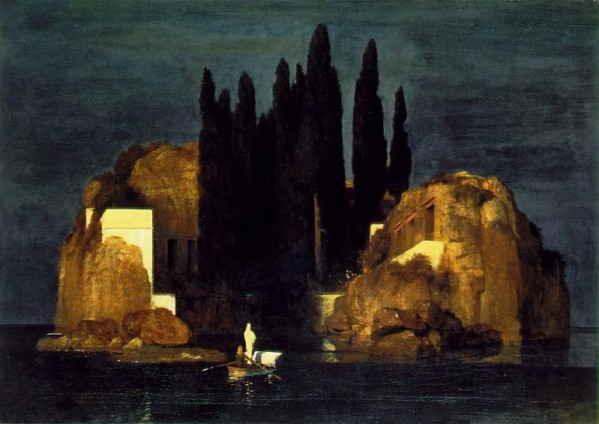
In order to sit down and establish any sort of ideology1 that guides my life, I really have only a single point to consider: art2 is, without a doubt, what is most important to me. Out of everything. I say this without a hint of irony, with a complete presence of sincerity: everything that has ever been important to me has been mediated by art, to some degree.
Perhaps this is easy for me to say because I equate art with pleasure. Or the idea that art is beauty (as a definition from dictionary.com would like to suggest). If this were true then I wouldn’t have anything to say here. But, the unfortunate thing is that there is a lot of bad art that makes me furrow my brow and launch into hyperbolic rhetoric or a complete insincerity (read: irony). The other negation to the aforementioned declarations heeds itself to my own ideas in an appreciation of affect over visual aesthetic: i.e., something ugly, terrifying, and evil can bring pleasure.
I am not an overly-depressed person. I am (fairly) high functioning in a pretty normal way. I have no desire to be constantly escaping from reality. Kneeling at the temple of Art is not about escapism for me, and I think that’s why I inherently hate the idea of mediating an experience of art (exclusively) through empathy (this is why I will always champion modes of art that lie outside of representation3).
I occasionally feel like when I make this declaration, I am widening a divide between myself & the general public. I say this without elitism. The problem is making a statement like this seems to establish binary opposition: if I don’t like representation, I must like crazy non-narrative abstract shit. Right? I mean, that binary presupposes the person who is contrasting her or his own approach to art with mine is able to conceive of an approach to art that is outside of representation (and this is part of why my mother has no idea in regards to what I am interested in and what I am doing when it comes to “art”).
But here’s the thing: I love narrative. I have no desire to escape narrative. Of course, throughout my experiences with art I have grown mostly tired of archetypal narrative arcs, neatly wrapped up stories, etc etc. But that’s not the point. What I look for in art, what I aim for in art, ultimately, as I’ve said many noted many times in comment threads, is affect.



